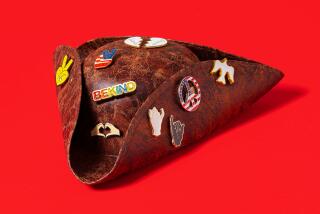Patriotism Gets Lost in Fireworks of July 4
- Share via
I had an uncle named French Quinn who was a lawyer and general mover and shaker in the county-seat town of Decatur, Ind. I always think of him come the Fourth of July because I still remember vividly many childhood years of going to the local park on that holiday and listening to my uncle make his patriotic speech. It never varied much, and I could have repeated it almost word for word after a few years, but it still would have been unthinkable to miss that event.
He spoke from a bandstand that housed concerts on summer evenings. There were flags draped around the podium, and the band backed him up with “The Star-Spangled Banner” before he started. I don’t know if the townspeople listened (they were, after all, as familiar with his speech as I was), but they were respectful. They appeared to listen. Patriotism was not a frivolous business, and July 4 was its day.
There was always a picnic after his speech--fried chicken and baked ham and potato salad--and then ample time to get home to shoot off my hoard of fireworks in our side yard. Private fireworks weren’t forbidden then. I suppose it is a good thing they are now, but only once in all those years do I remember anyone getting hurt, and that was more or less a deliberate act. I had a friend named Eddie whose parents were close to my parents, and we usually shared the Fourth with them. Eddie was an aggressive, pushy kid I knew I was going to have to fight sooner or later, but I preferred later.
On one memorable Fourth, I had a triple rocket I had been saving for last, and I set it up carefully in the middle of the yard so we could all enjoy the display of fire and color. As I bent over to light it--the high point of my day--Eddie ran up, said “I want to do it,” and pushed me aside. I was outraged, and in the scuffle that followed, the triple rocket was both ignited and accidentally turned over on its side. Eddie and I ran, and Eddie fell into a hedge. He lay helplessly on top of the hedge while the triple rocket grazed him three times in the seat of his pants. I suppose it could have been lethal, but I have never enjoyed anything so much in my life.
These days, fireworks are something you watch from a distant hillside, set off by unseen hands under strict supervision. It is a change that had to come, and I accept it. What I find harder to accept is that the reason we celebrate the Fourth of July--just as the reason we celebrate Christmas--has somehow gotten lost in the window dressing of the event. As in so many things today, the veneer is so thick that the substance can no longer seep through. And when it does, it is regarded as sappy. As a society, we have become very suspicious of anything that smacks of institutionalized emotion. We don’t assess the validity of the source. We just suspect--and reject it. My uncle French would be an anachronism today, and I thank God he isn’t around to discover that.
The event his patriotic speech celebrated, of course, is the signing of the Declaration of Independence on July 4, 1776. Not a few of the signers felt that the holiday should have been celebrated July 2, when delegates to the Second Continental Congress formally voted for independence. But that is a quibble. Much more important is at least a brief consideration amid the fireworks and double-headers and barbecues of the astonishing stability and longevity of the nation launched that day.
Thinking about the Independence Days of my childhood made me realize that there are a whole string of holidays we celebrate today almost mindless of the reasons they came about in the first place. I would be surprised if one person in 100 could explain the genesis, for example, of Memorial Day (which we used to call Decoration Day) and Labor Day. Yet, in my childhood, they had very specific meanings that seem almost totally lost today.
Memorial Day, which in 1890 was officially set aside to honor war dead, had its beginnings in the United States near the end of the Civil War when Southern women began placing flowers on the graves of Confederate soldiers killed in battle. As a child, I remember solemn trips to the cemetery on this day to pay respect to the dead and to fuss over the family plot. We would take shovels and rakes and clippers and fresh flowers, and the whole family would be involved in this cleanup exercise. I avoided such work whenever possible, but I can remember being a little awed by this pragmatic homage to people I had either never known or remembered only dimly.
Labor Day was set aside for homage to the workers of the nation. The first Labor Day was celebrated in New York in 1882, and it became a national holiday a dozen years later. Although it was a cheerless day to me because it meant the imminent start of a new school year, it was also the occasion for parades, which I dearly loved. I remember well the cadres of workers, their union banners held proudly aloft, marching exuberantly in the industrial town in which I grew up.
This kind of simple, unsophisticated observance of our national holidays will probably never be possible again. It was possible then largely because we were able to look away from complexities that would have cast shades of gray over these events. But that knowledge doesn’t make them any less attractive in retrospect. Someday, I would like to have one more triple rocket in my yard--pointed, this time, to the sky.


